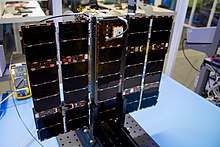Kepler Communications
| Private | |
| Industry | Telecommunications |
| Founded | 2015 |
| Founders | Mina Mitry, Wen Cheng Chong, Mark Michael, Jeffrey Osborne[1] |
| Headquarters | Toronto, Ontario, Canada |
| Website | keplercommunications.com |
Kepler Communications, Inc. is a private company, based in Toronto, Canada that specializes in satellite communications services, delivering affordable global connectivity through its network of small satellites.
Kepler’s ultimate goal is to build a low-cost in-space telecommunications network for spaceborne assets. A new type of space infrastructure capable of providing connectivity to other satellites, enabling real-time data transmission as well as command and control through its low-Earth orbit (LEO) constellation.[2]
The planned constellation of LEO satellites will consist of up to 140 nanosatellites that will deliver affordable telecommunications services to ground and space assets. As its constellation grows, Kepler offers an economic global satellite data backhaul service for remote business operations with high data needs. This high-capacity store-and-forward service is for businesses to periodically transport bulk data (e.g. videos, images, music, backlog and billing data) from the most remote locations of the planet where terrestrial networks are not available and other satellite communication services are simply too expensive. In addition, Kepler is working on an Internet of Things(IoT) solution for connected devices aimed at eliminating the existing challenges of network disparity across regions. The company is developing its platform specifically for low-power, low-bandwidth, and low-cost global connectivity for IoT applications.
The company is really focus on achieving great communication speeds. With the highest capacity throughput software-defined radio (SDR) available for nanosatellites, this radio comes with over 200 MHz of bandwidth, meaning it can easily get 500 Mbps through its device.

The company was founded in 2015 by four graduates students from the University of Toronto, who had spent the previous years working together on various design projects through the University of Toronto Aerospace Team.[3] The startup was incubated at University of Toronto's Entrepreneurship Hatchery, the Creative Destruction Lab, Ryerson University's DMZ, and was part of the Techstars Seattle 2016 cohort.[4] The startup raised $5M in a seed round financing and in the span of 12 months went from paper design to orbit.[5][6][7] In January 19, 2018, the company successfully launched their first satellite into orbit from a site in China with the second scheduled summer 2018.
References
- ↑ Kepler Crunchbase. Retrieved 10/08/2016
- ↑ https://www.3dhubs.com/blog/learn-how-kepler-rapidly-went-from-a-sketch-on-a-napkin-to-a-satellite-in-space-with-3d-hubs-cnc-machining/ 3D Hubs. Retrieved 12/06/2018
- ↑ Soper, Taylor. http://www.geekwire.com/2016/kepler-communications/ Geekwire. Retrieved 10/08/2016.
- ↑ Black, Chuck. http://acuriousguy.blogspot.ca/2016/02/toronto-based-kepler-communications-has.html The Commercial Space Blog. Retrieved 10/08/2016
- ↑ Etherington, Darrel. https://techcrunch.com/2016/08/09/kepler-gets-5m-to-launch-a-network-of-football-sized-iot-communication-satellites/ Techcrunch. Retrieved 10/08/2016
- ↑ Nickelsburg, Monica. http://www.geekwire.com/2016/techstars-grad-kepler-communications-raises-5m-launch-mini-satellites-2017-double-team/ GeekWire. Retrieved 10/08/2016
- ↑ Galang, Jessica. http://betakit.com/kepler-communications-raises-5-million-seed-round-to-develop-in-space-telecommunications-network/ Betakit. Retrieved 10/08/2016